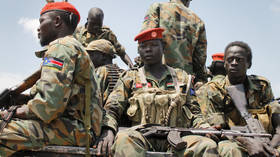Farewell, Incirlik? What US stands to lose if it’s evicted from crucial Turkish air base
Turkey’s President Erdogan said Ankara may evict US forces from its Incirlik and Kurecik bases, a response to Washington’s sanctions. The Pentagon is now doing everything it can to keep relations with Turkey from spiraling.
The Incirlik Air Base has a 3,048-meter-long runway that can accommodate any type of jet, including strategic bombers. There are aircraft dispersal areas, shelters, warehouses, communication centers at the base, as well as radio, lighting, navigation equipment, HQ units, maintenance and auxiliary areas. The US also stores 40 of its B61 nuclear bombs at the base.
It's the home of the 10th Air Wing of the 2nd Air Force Command of the Turkish Air Force, and the 39th Air Base Wing of the US Air Force. Estimates vary, but there are up to 5,000 US Air Force personnel stationed there.
Incirlik accommodates KC-135 Stratotanker aerial refueling tankers. These jets participated in the air operations in Syria and Iraq. There are also reconnaissance aircraft and drones at the base.
Incirlik was actively used by the US Air Force during the 1958 Lebanon crisis, Operation Desert Storm (1991), Operation Desert Fox (1998), as well as the wars in Afghanistan (from 2001), Iraq (from 2003), and Syria.
Regional Leverage
If Recep Tayyip Erdogan asks the Americans to pack up and leave (he might not even let them pack up), that will definitely reduce the US Air Force’s combat and operational capacity in the Middle East. Incirlik affords Washington serious leverage in its dealings with countries in the region and its ability to have an impact on their political and military situations.
So, if the United States were to lose the Incirlik Air Base, this would seriously reduce both its defense and offense capabilities, especially in the hypothetical case of a threat coming from Iran’s territory. And Erdogan knows this all too well. He knows which cards to play, and he is playing them to win.
Also on rt.com US-Turkey relations at critical crossroads: what’s behind Erdogan’s threat to shutter Incirlik Air Base?Other High-Profile Losses
Another important asset of the US armed forces and a key element of NATO’s missile defense network is a transportable radar installed in Kurecik, in southeastern Turkey, not far from the border with Syria. The station is located in Malatya Province on a hill 2,100 meters above sea level and is capable of detecting ballistic missiles at ranges of up to 1,000 km. Losing this radar would significantly limit NATO’s missile-attack warning capabilities.
As for the US nuclear weapons that have reportedly been stored at Incirlik, they are most likely no longer there. We have reasons to believe that the Americans moved the nukes soon after the attempted coup d'état in Turkey of July 2016. So, it’s possible that the Incirlik warehouses where B61 bombs used to be stored are currently empty.
Divides within the alliance
Will it take long for the US to pack up what remains and meet the tight deadline that Erdogan will most definitely set if this scenario unfolds? US aircraft need just a couple of hours. The AN/TPY-2 radar, too, can be put in a Boeing C-17 Globemaster III and shipped off to the closest European base.
Also on rt.com ‘Disrespect to our sovereign decisions’: Ankara hits back after US Senate committee greenlights Turkey sanctions billHowever, it will be much harder to estimate the funds that were invested in the infrastructure and would be lost in a hasty escape. Permanent structures cannot be transported either by air or rail.
It would be an extravagance on the part of the US to give up on such assets as the air base at Incirlik. Its geopolitical value is exceptional.
Eventually, Ankara and Washington may come to some agreement (compromise). Attempts by the US to mount pressure on Erdogan may lead to extremely adverse ramifications, possibly with a major divide in what until recently was a monolithic alliance.
Certainly, Ankara still draws heavily on imports of many types of armaments, hardware and spare parts from the West. However, NATO membership is no longer a vital necessity for Ankara.
The bloc will not help Turkey resolve a wide range of military and political issues the country is facing, such as relations with neighboring Greece and the situation with oil and gas offshore reserves in the Eastern Mediterranean.
Like this story? Share it with a friend!
The statements, views and opinions expressed in this column are solely those of the author and do not necessarily represent those of RT.
















